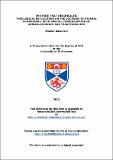Files in this item
The fire that reconciles : theological reflections on the doctrine of eternal punishment, with special consideration of annihilationism and traditionalism
Item metadata
| dc.contributor.advisor | Holmes, Stephen R. | |
| dc.contributor.author | Bawulski, Shawn | |
| dc.coverage.spatial | 289 | en_US |
| dc.date.accessioned | 2012-09-20T20:53:53Z | |
| dc.date.available | 2012-09-20T20:53:53Z | |
| dc.date.issued | 2012-06-19 | |
| dc.identifier | uk.bl.ethos.556407 | |
| dc.identifier.uri | https://hdl.handle.net/10023/3115 | |
| dc.description.abstract | This study enters into the dialog within Christian theology between annihilationism and traditionalism on the nature of eternal punishment. The positions and issues within the topic will be examined theologically and analyzed doctrinally. In my first chapter I will summarize the views and arguments in the debate, establish operating definitions, address preliminary issues, and provide some historical context. I will establish a thesis agenda with dual aspects: negatively, to examine and critique annihilationism on theological grounds, and positively to offer arguments for a modified traditionalism. Chapters two, three, and four primarily serve the negative purpose. Chapter two critically considers annihilationism on exegetical and hermeneutical issues, concluding that the view is inferior to traditionalism. Chapter three examines annihilationism for consistency with other areas of Christian theology, concluding that the view generates major theological problems in Christology. Chapter four considers both annihilationism and traditionalism regarding the disproportionality problem of hell, concluding that annihilationism and two types of traditionalism can resolve the problem but of these three only one sort of traditionalism can do so whilst also satisfying other important theological criteria. Regarding the negative aspect of the thesis, I conclude that the severe theological problems in annihilationism constitute sufficient reason to reject the view. In chapter five I accomplish the positive aspect of this thesis, offering six criteria of success for any view of eternal punishment. I then provide detailed argumentation for a modified traditionalism called reconciliationism, concluding it best meets these criteria and is the most theologically and exegetically satisfying view on offer. In the concluding chapter I state this thesis’ contributions, suggest several areas for further research, and offer some implications for pastoral theology. I finally conclude that annihilationism has seemingly insurmountable theological problems, but a modified traditionalism can succeed as a doctrine of hell. | en_US |
| dc.language.iso | en | en_US |
| dc.publisher | University of St Andrews | |
| dc.subject | Hell | en_US |
| dc.subject | Eternal punishment | en_US |
| dc.subject | Reconciliationism | en_US |
| dc.subject | Annihilationism | en_US |
| dc.subject | Traditionalism | en_US |
| dc.subject | Christian | en_US |
| dc.subject | Theology | en_US |
| dc.subject | Doctrine | en_US |
| dc.subject.lcc | BT836.3B2 | |
| dc.subject.lcsh | Hell--Christianity | en_US |
| dc.subject.lcsh | Future punishment--Christianity | en_US |
| dc.subject.lcsh | Annihilationism | en_US |
| dc.subject.lcsh | Theology, Doctrinal | en_US |
| dc.title | The fire that reconciles : theological reflections on the doctrine of eternal punishment, with special consideration of annihilationism and traditionalism | en_US |
| dc.type | Thesis | en_US |
| dc.type.qualificationlevel | Doctoral | en_US |
| dc.type.qualificationname | PhD Doctor of Philosophy | en_US |
| dc.publisher.institution | The University of St Andrews | en_US |
This item appears in the following Collection(s)
Items in the St Andrews Research Repository are protected by copyright, with all rights reserved, unless otherwise indicated.

